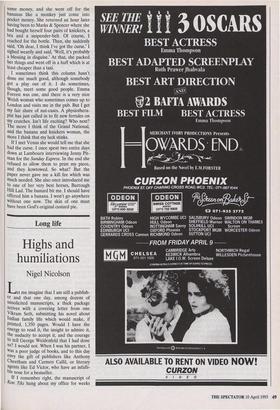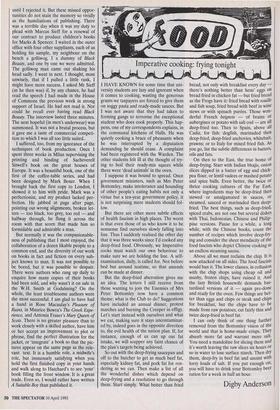Long life
Highs and humiliations
Nigel Nicolson
If I remember right, the manuscript of '(on Tiki hung about my office for weeks until I rejected it. But these missed oppor- tunities do not stain the memory so vividly as the humiliations of publishing. There was a terrible day when it was my duty to plead with Marcus Sieff for a renewal of our contract to produce children's books for Marks & Spencer. I waited in the outer office with four other suppliants, each of us holding his sample, my neighbour on the bench a golliwog, I a dummy of Black Beauty, and one by one we were admitted. The golliwog man came out shaking his head sadly. I went in next. I thought, most unwisely, that if I pulled a little rank, I might have more success. I asked Mr Sieff (as he then was) if, by any chance, he had read the speech I had made in the House of Commons the previous week in strong support of Israel. He had not read it. Nor could he recall ever having read Black Beauty. The interview lasted three minutes. The next hopeful (in men's underwear) was summoned. It was not a brutal process, but it gave me a taste of commercial competi- tion to which I was all too little suited..
I suffered, too, from my ignorance of the techniques of book production. Once I spent three weeks in Milan supervising the printing and binding of Sacheverell Sitwell's book on the great houses of Europe. It was a beautiful book, one of the first of the coffee-table series, and had been designed by Mark Boxer. When I brought back the first copy to London, I showed it to him with pride. Mark was a perfectionist, and my product lacked per- fection. He jabbed at page after page, pointing out wrong alignments, broken let- ters — too black, too grey, too red — and halfway through, he flung it across the room with that scorn that made him so formidable and admirable a man.
But normally it was the companionable- ness of publishing that I most enjoyed, the collaboration of a dozen likable people to a common end, and the diversity of our work on books in fact and fiction on every sub- ject known to man. It was not possible to be bored, but it was possible to despair. There were authors who rang up daily to enquire how many copies of their books had been sold, and why wasn't it on sale in the W.H. Smith at Godalming? On the whole, the least troublesome authors were the most successful. I am glad to have had a hand in Rose Macaulay's Pleasure of Ruins, in Maurice Bowra's The Greek Erpe- Hence, and Antonia Fraser's Mary Queen of Scots. There is no greater pleasure than to work closely with a skilled author, have him or her accept an improvement to plot or phrase, find the perfect illustration for the jacket, or 'integrate' a book so that the pic- tures appear on the same page as the rele- vant text. It is a humble role, a midwife's role, but immensely satisfying when you hold the first finished copy in your hands and walk along to Hatchard's to see 'your' book filling the front window. It is a great trade. Even so, I would rather have written A Suitable.Boy than published it.



























































 Previous page
Previous page